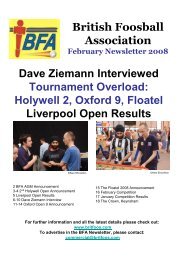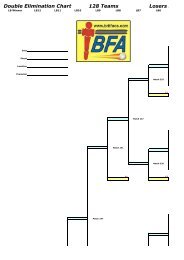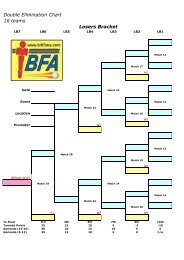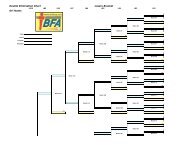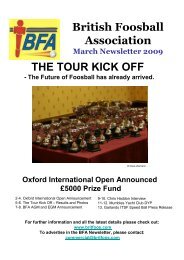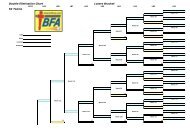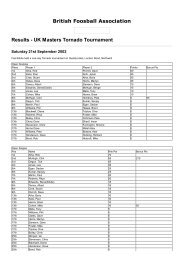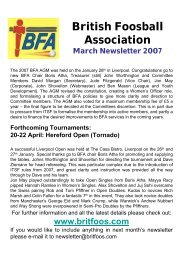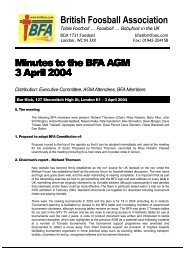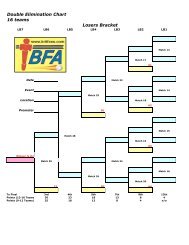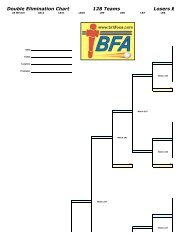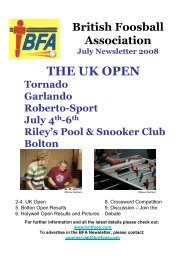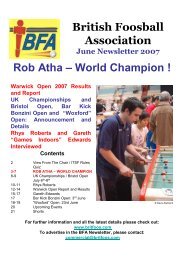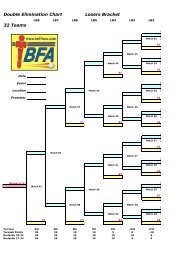ROB ATHA INTERVIEWED - British Foosball Association
ROB ATHA INTERVIEWED - British Foosball Association
ROB ATHA INTERVIEWED - British Foosball Association
You also want an ePaper? Increase the reach of your titles
YUMPU automatically turns print PDFs into web optimized ePapers that Google loves.
<strong>British</strong> <strong>Foosball</strong><br />
<strong>Association</strong><br />
January Newsletter 2010<br />
<strong>ROB</strong> <strong>ATHA</strong><br />
<strong>INTERVIEWED</strong><br />
© Dave Ziemann<br />
2. Editorial<br />
3-7 Rob Atha Interview<br />
8-11 Liverpool Open Announcement<br />
12. Keele Open Results<br />
13-14. <strong>Foosball</strong>Ban in Turkey<br />
15. Reading Open Results<br />
For further information and all the latest details please check out:<br />
www.britfoos.com<br />
To advertise in the BFA Newsletter, please contact:<br />
commercial@britfoos.com
January Newsletter 2010<br />
Editorial<br />
So we’re starting another year!<br />
There are some real highlights to look forward to with the ITSF World Cup this month in Nantes –<br />
Lets hope the team do us proud! The competition is held from January 7 th to 10 th – be sure to keep<br />
an eye on Britfoos and the ITSF website – www.table-soccer.org for full details of how the <strong>British</strong><br />
(and Irish!) teams get on.<br />
The <strong>British</strong> men’s team are drawn with Germany, India and China, while the women have<br />
Cameroon, Japan and France. The juniors have a tough draw against France, Netherlands,<br />
Portugal and South Africa, while the single Group for the Senior event sees Britain play tough<br />
competition including Germany, France and the USA. Rob Atha has given a great interview in this<br />
newsletter where he discusses the UK Captaincy amongst many other fascinating insights.<br />
Looking forward there aren’t many tournaments currently in the calendar, here’s hoping that Mase,<br />
Steve Lyall, Boris, Mayya Racy (and Jon May), Bill Donne, Keele Table Football and all the others<br />
who organised competitions in 2009 feel the urge to continue in 2010! The Liverpool Open will take<br />
place later in January, see the further details in this Newsletter.<br />
Not enough thanks is given to those players who selflessly give up time and effort – often planning<br />
for months before hand to make these events happen. The BFA now has access to Garlando,<br />
Tornado and Roberto-Sport tables available for hire at ranking tournaments in the UK – for moe<br />
details contact chair@britfoos.com.<br />
A special mention to JP Thomson in London, who is putting an awful lot of effort into spreading the<br />
table football gospel – keeping current venues going, and organising competitions at new venues.<br />
It is notable that he is not only appealing to the current Foos community, but getting out and<br />
advertising to new areas and players. He runs very professional and fun tournaments - at the<br />
expense of not being able to take part himself – the sacrifice is much appreciated!<br />
One recurring theme of the UK table football scene is the need to encourage local venues to take<br />
centre stage. The BFA Club membership has not so far been a noticeably successful innovation,<br />
while the BFA League has been in limbo for much of the last two years.<br />
A priority for the whole of the UK Foos community – players, BFA committee, operators – must be<br />
to encourage the grass roots venues in the coming year. Only by continually refreshing and<br />
reinvigorating the scene will table football in the UK grow to the next level – on the bright side at<br />
least foosball isn’t banned in the UK (see page 13 for details of Turkey’s foosball ban!)<br />
Finally, many thanks this year to Tom King, who has taken the website by the scruff of the neck,<br />
and gave it a long overdue overhaul and update!
January Newsletter 2010<br />
Rob Atha<br />
Interview<br />
The Newsletter is privileged this month to get an interview with Rob Atha, the undisputed UK<br />
number 1 player for nearly 10 years. Rob broke onto the scene at the end of the 1990s, winning his<br />
first tournament at the Earl Haig in Hounslow at the age of 14 in 2000. Since then he has<br />
performed incredibly at national and international level, winning the ITSF World Championship<br />
doubles (with Joe Hamilton), and WCS events on Tecball and Bonzini.<br />
Rob is also Captain and Selector of the UK national team, representing the country at the ITSF<br />
World Cup being held in Nantes in January 2010.<br />
1. How did you get started playing<br />
I started playing foos due to my dad (Boris), we had a season ticket at Leeds and after the match<br />
we would go to his friends house Dimitri's who had an old Garlando and I would always want to<br />
play and get my ass kicked by both of them. I really got interested after a holiday in Kenya in 1998,<br />
I was beating everyone in the hotel, and when we got home, my dad started to look for places to<br />
play, then we found the Rainbow.<br />
2. When you were beginning – who did you learn from the most<br />
At the start, I mainly learned from Dave Perrott, he helped me learn a snake, he taught me the<br />
basics, and from playing doubles with him, he made me realise about other options of the game,<br />
rather than just going long all the time. Also a big influence was Tanny, I respected his game the<br />
most and I used to hate playing him because he was so smart, he had the simplest 5 bar but very<br />
effective and by watching him and playing him every week, my game improved loads. The Rainbow<br />
back then was very competitive, because if you lost you would have to wait 45 mins to play again<br />
and every team was a regular pairing like: Tanny/Khalid, Eddy/benge, Stu/Boris, Les/Tony,<br />
Sohaib/Craig. But now everyone goes there for a laugh and nobody seems to care anymore.<br />
3. I remember you winning your first open singles in Hounslow at one of Tich’s tournaments (next<br />
to Hounslow West tube station IIRC) – what did that feel like as a 14 year old Was it a shock, or<br />
did you feel that it was something that you could expect to do<br />
Tbh, I didn't expect it, it was awesome back then to win, as a 13-14 yr old I used to thrive on<br />
beating older players and embarrass them in front of their mates, I hated to lose, I still do but I can<br />
handle it now. At the time it was a shock, but after it came pressure of winning again, which<br />
motivated me more and more and that’s when I started going abroad to play because I knew there<br />
were bigger challenges ahead.<br />
4. When you first appeared on the scene you seemed to be very much a snake shooter – however<br />
you also have an awesome pull shot (from attack and defence). Was this something you always<br />
had in the armoury, or was it something that you developed when you were already a top player<br />
I started shooting a pull on the blocky Garlando because I found it hard to snake on them due to<br />
the small goals I didn’t really understand the theory of picking holes back then, I just went long and<br />
long etc, then Dave taught me the fake/straight which made people jump, but I was guessing %100
January Newsletter 2010<br />
Rob Atha<br />
Interview<br />
of the time and just used the speed of the shot to score. I always had the technique for the shot, I<br />
just developed the mental aspect behind the shot in time, now I barely shoot it on the 3, I haven't<br />
for 2-3 years as its too much effort and I prefer to score now with less effort.<br />
5. How much time do you spend practicing now And how much when you were younger, breaking<br />
through on the National and International scene<br />
I used to practice all the time, I would play Boris for 1-2 hours a day, plus go to the Rainbow 2<br />
times a week, I couldn’t play enough, always wanted more, after every tournament I would learn<br />
something new, albeit either a new pass, or shot, 1 big turning point for me was when all the<br />
Austrians came to Oxford, in 2000 I think, they had a different style, the tic tac and dummy shots<br />
which they used to great effect, Dave P studied Laszlo and saw how he was doing it, then he told<br />
me and I learned it and I used to love scoring it because the opponents hate it because it looks so<br />
easy. But I would say from 2005-2008 I didn’t practice at all, I was playing tournaments every<br />
weekend on all the different tables so that was enough for me.<br />
6. Do you have set practice routines like Joe has detailed previously on the forum and in the<br />
Newsletter, or do you just try whatever you fancy<br />
During practice I get really bored, I have no routines, I will play with the 5 for 5mins, then throw the<br />
ball around on the 2bar and try different shots. I don’t think I could practice alone for more than 15<br />
mins. If someone is there I would play against them, I much prefer that.<br />
7. You are very naturally talented – but at what point did you feel that your mental game started to<br />
catch up with your skills<br />
Around 2005, I was living with Billy Pappas for a while and we studied other players and practiced<br />
different things, and just playing against him most of the time helped me loads as before I never<br />
practiced with someone who was better than me. so I was stuck at a certain level, I think I jumped<br />
up a level during that time.<br />
8. You have had a number of different regular/ semi-regular partners (Your Dad, Dave Perrott, Juj<br />
Sohi, Joe Hamilton and many international players. How do you decide who you will play with at a<br />
tournament Given a free choice would you play with Fred (Collignon) in every tournament and<br />
give yourself the best chance of winning, or would you prefer to play with anyone else, or would<br />
you prefer to always mix it up a little<br />
I always enjoy mixing it up, when I started I wanted to play with the best, Dave back then was one<br />
of the best defenders in the country, after a while I was good friends with Juj and he was always in<br />
the finals against us, so we struck a partnership then. In the UK for last few years, I don't really<br />
care who I play with; Me and Joe hit it off straight away plus he is in the top 3 in England, anyway.<br />
On the international scene, I would play with Fred anytime he wants, he is the best player ever and<br />
any chance to play with him and learn how he deals with things would only help my game to. But<br />
generally I like to mix it up because if you play with someone too much then its easier to argue and<br />
gets boring.
January Newsletter 2010<br />
Rob Atha<br />
Interview<br />
9. The ITSF World Championship Doubles triumph with Joe stands out as being a highlight of your<br />
career – is this what you consider your best result or is it one of the others – for example: 2nd in<br />
the Garlando WCS with Joe against a very large very good field and winning the Tecball WCS<br />
Doubles with Tom Vandecauter beating Fred in the final – are ones that I think may have been<br />
even more difficult to achieve than the ITSF World Championship<br />
All of the above, winning the Austrian Nationals in 2003 was a big confidence booster for me as I<br />
beat Dalibor in the final, at the time he didn’t lose for, like, 2 years. The other big one is getting to<br />
the final in 2004 Garlando Worlds in Singles. Winning with TomVdc at Tecball I still consider the<br />
best as we had to double dip Fred in his own country in the final.<br />
But also getting to the final of OD at Garlando Worlds was massive as Joe made me enjoy foosball<br />
at that tournament, he was a Tornado forward playing Garlando goalie and he was feeding me the<br />
ball like a starving Kenyan. Everything about that event was awesome, was a good feeling.<br />
Winning last year in Nantes was great but Fred/Billy not being there, and there being no prize<br />
money made it less prestigious for me. We had no hard games apart from the final to be honest,<br />
and that should have been 3-0 too. I think getting to the final of Singles at the Bonzini worlds was<br />
really difficult as I can hardly play on that table, I just used my experience to get the job done.<br />
10. You started as very much a Tornado player, but had earlier international success on Garlando.<br />
What is your favourite table What do you think of the more recent changes to the tables that have<br />
been made (e.g. Garlando goalposts and ball changes, Tornado 3 man goalie going to 1, Bonzini<br />
and Roberto-Sport ball changes) Are they for the good of the game, or should the tables be left<br />
alone to provide variety and uniqueness to each table<br />
I think they should leave each table as it is, it’s stupid when they change it, Tornado is my favourite<br />
table as it’s the only table in which my game doesn't feel limited to 1-2 things. On the other tables I<br />
have to break my game down and simplify it which brings my level down and makes it easier for<br />
players to play me.<br />
11. You are always up for socialising at tournaments. (This is something that I think most players<br />
(old pros and noobs alike) really appreciate the chance to catch up and have a beer (or two) with<br />
you and chat about foos and life). Have you ever regretted a late night the next day when it has<br />
cost you a result against someone you felt you should beat, or do you see the tournament social<br />
experience as being something that you wouldn’t want to miss out on for the sake of the odd<br />
additional win<br />
I love socialising at tournaments, I wouldn't change anything about my past if i could, I used to go<br />
to tournaments more for the good time and meeting friends rather than to go and win. Surprisingly<br />
some of my best results come from when I had no sleep the night before, when me and Tom won<br />
Tecball OD, I had 1-2 hours sleep the night before and I drank about 13 beers throughout the day.<br />
lol.
January Newsletter 2010<br />
Rob Atha<br />
Interview<br />
12. What was the best tournament you ever went to from the social side<br />
Jeesh, there have been loads, Vegas is always up there, any tournament where Martin Fritsche<br />
was there as he makes a boring tournament into a good time. I used to love the Austrian<br />
tournaments when I was 17-20, as they all drank loads and partied until they were calling matches<br />
the next day. Over time I have realised that the Poles/Austrians drink the most and would<br />
recommend all of their tournaments if you are looking to have fun. The best social tournament has<br />
to be Lodz 2007 in Poland, Garlando, me and Kane went there and got really drunk and that<br />
tournament holds the funniest memories for me.<br />
13. And from the organisational side – which tournament was the most professional you have ever<br />
played in<br />
The Bonzini worlds every year is always the best organised. They make it look professional and<br />
are a level above the rest. It’s just a shame about the players there. I’m saying no more.<br />
14. What is your worst moment at a tournament<br />
My lowest feeling, and where my confidence was lowest was during Dallas this year in OD, it was<br />
the most important for me and I just couldn't peform. Sorry Brandon.<br />
That same feeling I had in Germany in 2006 on Lehmacher at there tournament, I lost everything<br />
on the Saturday, in AD, OM, OD. But on both occasions I did really well in singles the next day.<br />
15. You have a lot of experience of tournaments in different countries - what little things can be<br />
done to UK tournaments do to make them better (without spending loads of money / time)<br />
For me, the UK tournaments are fine, bring back the 1 day tournaments and decrease the amount<br />
of events to 6, OD, OS, SPD, SPS, NS, ND. I really don’t like tournaments over running on the<br />
Sunday. It’s cheaper to everyone involved.<br />
16. Who do you think is the most naturally talented player (from any country) you have ever played<br />
That’s easy, Billy Pappas. He can do things people don't even know about.<br />
17. You are Captain and Selector of the National team – what does this mean to you Is it a<br />
headache of worrying that you will make the right decisions, or that people will be upset if they are<br />
left out – or is it something that you enjoy as it gives you the chance to use tactical selections and<br />
advice to try and squeeze a win in a tightly fought international match<br />
Its a honour for me to be the captain, most of the time the team picks itself, so on the hard ones I<br />
talk to the other players on the team and see what they think. This year was the biggest headache I<br />
have had, as there was 4 or 5 players for the last 2 spots. I am excited this year as everyone<br />
knows their position in the team, a more simple format makes selection easier.<br />
18. Which pairings are you thinking of for the World Cup Who do you see as making a good<br />
pairing – are you looking for players that can swop or are you picking them specifically as attackers
and defenders<br />
As its a short format I’m gonna pick an Attacker with a Defender, the main reason behind this is<br />
that the players should feel more comfortable knowing their role. If it was different the players<br />
would play a little different and play with a different pressure and try and hide behind a player in the<br />
team rather than taking responsibility in the match and making things happen.<br />
19. And who will you be looking to for crunch singles matches<br />
Every match is a crunch one, everything counts, so whoever is called upon should give their best.<br />
20. As captain and best player – what can you do to help other players in the <strong>British</strong> team Do you<br />
advise them on their strengths and weaknesses and what tactics to try in different circumstances,<br />
or do you offer less technical advice and encouragement<br />
I will do anything which I feel will help us. Before the German match I will give advice about the<br />
strengths and weaknesses of the players we will play, I think its most important for us to be<br />
aggressive because when your aggressive the chance of lucky goals is higher, plus it puts fear into<br />
the opponents and it shows confidence. Body language is huge, we have to show everyone that we<br />
are there to win and be afraid of nobody.<br />
21. What do you think of the BFA What do they do well and what do they do badly<br />
I will support the BFA of course, I can't really criticise them because they are trying to make things<br />
happen rather than sitting and waiting for things to happen. I think to generate more income they<br />
should advertise more, in Germany there are 10 or more players who have their own website and<br />
they do exhibitions nearly every weekend for like 1-2000 Euros, they take a table there and perform<br />
and put on a show. Surely, if the BFA hired 1-2 good players to do the same and take a big cut of<br />
the money then everything’s good.<br />
22. Would you ever consider standing for committee yourself<br />
No in the near future, but who knows.<br />
January Newsletter 2010<br />
Rob Atha<br />
Interview<br />
23. What would you like to see done in the UK game to take it forward If you were chair of the<br />
BFA for one day what change would you make<br />
Firstly, try and get some sort of sponsorship and make a tour like P4P is doing in Germany, they<br />
have 10-12 tournaments a year with 5K prize money at every one. So I would get in touch with<br />
whoever the president is in the P4P and pick their brains on how they did it.<br />
24. What are your plans for the coming year(s) Do you see yourself continuing to globe trot<br />
playing foos, or will this have to end as real life intervenes and bills and mortgages etc become a<br />
reality. (Don’t do it is my advice – I still want to go back to serving burgers and fries…)<br />
Well continue as I am, going to the big tournaments hopefully, I have bills and rent to pay so I can't<br />
go to as many tournaments as I would like, but the ones I go to, I will try and win and do my best.<br />
I’m just looking forward to Nantes, lets get behind the team and do the country proud!
January Newsletter 2010<br />
Liverpool Open<br />
29 th -31 st January 2010<br />
Rileys Liverpool Grand Central<br />
Bolton Street Liverpool L3 5LX<br />
12-13x Garlando Tables<br />
ITSF Pro-Tour status confirmed<br />
Provisional Schedule<br />
Friday 29th Jan<br />
6pm Registration<br />
8pm Novice Doubles (Beginners)<br />
9pm DYP (draw your partner)<br />
Saturday 30th Jan<br />
10am Registration<br />
10.30am Events continue<br />
11am Semi-Pro Singles*<br />
11am Amateur Singles*<br />
12 noon Senior Singles<br />
1pm Open Singles<br />
2pm Senior Doubles<br />
3pm Womens Singles<br />
4pm Novice Singles<br />
5pm Semi-Pro Doubles<br />
7pm Al Volo Open Doubles (NEW)<br />
Sunday 31st Jan<br />
11am Events Continue<br />
11.30am Open Doubles<br />
12.30am Amateur Doubles<br />
1pm Junior Singles<br />
1.30pm Womens Doubles<br />
2pm Pro-Am Doubles<br />
3pm Junior Doubles<br />
4pm Mixed Doubles
January Newsletter 2010<br />
Liverpool Open<br />
Entry & Table Fee Package Deals<br />
Men – Pro-Master £50, Pro £40, Semi-Pro £40, Amateur £30, Novice £20<br />
Pro-Master/Pro Packages include: Open Singles, Open Doubles, Pro-Am, Mixed doubles<br />
Semi-Pro Package includes: Open Singles, Open Doubles, Semi-Pro Singles Semi-Pro Doubles, Pro-<br />
Am, Mixed doubles<br />
Amateur Package includes: Open Singles, Open Doubles, Pro-Am, Mixed doubles, Amateur Singles,<br />
Semi-Pro Doubles, Amateur Doubles<br />
Novice Package Includes: : Open Singles, Open Doubles, Pro-Am, Amateur Singles, Semi-Pro<br />
Doubles, Amateur Doubles: Novice Doubles, Novice Singles<br />
Women – Pro-Master £15, Pro £12, Semi-Pro £10, Amateur £7, Novice £4<br />
Package adds Womens Singles, Womens Doubles to basic package<br />
Add £10 (£5 Novices) for players entering women singles/doubles & mixed only<br />
Juniors - (Born 1992 or later) receive half-price package deals including Junior events<br />
Junior Sunday Package £5 – Junior Singles, Junior Doubles, Amateur Doubles, Novice Singles &<br />
table fee *Package deals do not include DYP, Senior Singles/Doubles, or Al Volo Doubles<br />
Entry Fees (per player per event)<br />
Event Pro-Master Pro Semi-Pro Amateur Novice<br />
DYP £5 £5 £5 £5 £5<br />
Senior Singles £5 £5 £5 £5 £5<br />
Senior Doubles £5 £5 £5 £5 £5<br />
Semi-Pro Singles* n/a n/a £10 £10* £10*<br />
Amateur Singles* n/a n/a n/a £6 £4<br />
Open Singles £20 £15 £10 £6 £4<br />
Womens Singles £10 £10 £8 £5 £3<br />
Open Doubles £20 £15 £10 £6 £4<br />
Semi-Pro Doubles n/a n/a £10 £6 £4<br />
Novice Singles n/a n/a n/a n/a £2<br />
Novice Doubles n/a n/a n/a n/a £2<br />
Amateur Doubles n/a n/a n/a £6 £4<br />
Womens Doubles £10 £10 £7 £5 £3<br />
Pro-Am Doubles £5 £5 £5 £5 £5<br />
Mixed Doubles £5 £5 £5 £5 £5<br />
Junior Singles £5 £5 £5 £2 £1<br />
Junior Doubles £5 £5 £5 £2 £1<br />
Al Volo Doubles £5 £5 £5 £5 £5<br />
* Eligible players must choose between semi-pro singles and amateur singles, amateurs wishing to<br />
enter semi-pro singles must pay difference in entry fee.<br />
Table Fees<br />
Tables are on freeplay, a table fee of £10 (£5 for Sunday only) is levied on all participants (table fee is<br />
included in package deals). Exceptions – players entering ONLY novice doubles OR Junior<br />
Singles/Doubles pay £1 per player per event
January Newsletter 2010<br />
Liverpool Open<br />
Prize Funds<br />
Prize funds will be 80% of entry fees (balance covers trophies, advance costs, registration fees and<br />
other expenses), except for Junior and Novice events which are for trophies only. The distribution will<br />
vary depending on turnout in each event using the standard BFA formula (rounded to nearest £5 if<br />
over £30, otherwise to nearest £1).<br />
Eligibility<br />
All players must provide full details and be registered with the BFA as provisional or full members<br />
before competing. Registration/membership available on-site.<br />
All Pro and Pro-master players are obliged to observe the ITSF Dress code (sports dress, no denim)<br />
– All players are strongly encouraged to observe the dress code. Failure to observe the code could<br />
result in you forfeiting your match or being expelled from the tournament.<br />
Open Singles/Open Doubles – any player<br />
Semi-Pro Singles/Semi-Pro Doubles - Any player ranked semi-pro or below in BFA Garlando<br />
Rankings; Any overseas player who fulfils all of the following criteria<br />
- less than 500 points on the Internationale Garlando Rangliste and not otherwise ranked ‘pro’ in the<br />
IGR<br />
- a total of under 100 ‘open’ points (singles + doubles) in ITSF rankings<br />
- not ranked Master or Elite in P4P rankings,<br />
- not ranked Pro Elite in FFFT Classement Generale<br />
- not ranked Pro-Master in VIFA or European Tornado Rankings<br />
- not a player in National or 1st Regional league (BE/NL)<br />
Amateur Singles/Amateur Doubles - Any player ranked Amateur or below in BFA Garlando<br />
Rankings<br />
Any overseas player resident in the UK who is not ranked semi-pro or equivalent in another<br />
jurisdiction<br />
Novice Singles/Novice Doubles - Any player ranked Novice in the BFA Garlando Rankings<br />
Any unranked UK National or UK-resident player<br />
Junior Singles/Junior Doubles – Any player born on or after 1-1-1992 – ID required<br />
Senior Singles/Senior Doubles – Any player born in 1959 or earlier – ID required<br />
Pro-Am Doubles - Novice players can partner any other player<br />
Amateur players can partner any player who is not Pro-master<br />
Semi-Pro Players can partner any player who is not Pro or Pro-Master<br />
Pro Players can partner any Amateur or Novice player<br />
Pro-Master Players must partner a Novice player<br />
DYP – Any Player<br />
Al Volo Doubles – Any Player – Traditional Italian rules, no more than one touch allowed per rod,<br />
fast and furious play guaranteed!<br />
Womens Singles/Womens Doubles – any female player<br />
Mixed Doubles – Any male player plus any female player<br />
Important Note – Any event with fewer than 3 entries will be cancelled!!!
January Newsletter 2010<br />
Liverpool Open<br />
Travelling by Rail<br />
Liverpool is served by Liverpool Lime Street Station with direct services to London Euston and<br />
connections from all over the UK. Check out http://www.thetrainline.com for timetables and ticket<br />
prices. Lime Street Station is less than 3 minutes walk to the venue, with Liverpool Central 5 minutes<br />
walk dealing with local/regional lines. On foot, exit Lime Street to the left hand side of the concourse,<br />
turn at the bottom along Lime Street (or directly on to Bolton street from the side entrance) and take<br />
1st left up Copperas Hill. Venue is 100 yards up the hill on your left.<br />
Travelling by Road<br />
Enter Liverpool via the M62/Edge Lane corridor and follow signs for ‘City Centre’ and then signs for<br />
‘Lime Street Station’. Venue is approx 200m south of the station complex. The venue is on the corner<br />
of Bolton Street and Copperas Hill. For those entering the city via the M53/Wallasey tunnel, follow<br />
‘City Centre’ direction (right lane) out of the tunnel, then stay in middle lane when approaching the city<br />
centre, turn left at roundabout for Birkenhead tunnel, get into the right lane and turn right at the set of<br />
traffic lights at the top of the hill, follow Lime St and take second left after the station, the venue is<br />
100m on the left.<br />
Parking<br />
There is only time-limited daytime street parking available near the venue with very sharp traffic<br />
wardens even at weekends – this is Liverpool City Centre! There are public car parks in Mount<br />
Pleasant (around 300m away) and at the top of Copperas Hill allowing attractive all-day rates, the car<br />
park on Bolton Street next to the venue is expensive and closes at tea-time, or St John’s Shopping<br />
Centre (but check closing times). Use of Public Transport is strongly recommended. There is an all<br />
day £5 car park 10 minutes walk away on the corner of Hope St and Hardman St.<br />
The venue is located on the corner of Bolton Street and Copperas Hill<br />
Flying to Liverpool<br />
Liverpool John Lennon Airport (LPL) has excellent connections to cities throughout Europe, being a<br />
hub for several Budget airlines. Booking early is recommended for the cheapest flights. Do NOT fly to<br />
Stansted!! It is at the other end of the country with very poor transport links!!<br />
Accommodation<br />
Liverpool is a major European city, and has a range of hotels to suit all budgets. The list below is not<br />
exhaustive but includes most places within walking distance of the tournament venue. Listed prices<br />
are from 2008 and subject to change.<br />
See:<br />
http://forum.britfoos.com/forum/viewtopic.phpf=1&t=7976<br />
for full and latest details
January Newsletter 2010<br />
Keele Open Results:<br />
28 th -29 th November 2009<br />
Open Doubles<br />
1. Hamilton, Joe Atha, Rob<br />
2. Burdett, Tom May, Jonathan<br />
3. Yeung, Simon Lyall, Stephen<br />
Womens Doubles<br />
1. Brice, Sarah Ramlee, Hannah<br />
2. Brice, Amy Walding, Jody<br />
3. Lasecka, Olga Knox, Emily<br />
Pro Doubles<br />
1. Lyall, Christopher Kingston, Dan<br />
2. Yeung, Simon Davey, Rob<br />
3. Addison, Graeme Haigh, Chris<br />
Mixed Doubles<br />
1. Atha, Rob Lasecka, Olga<br />
2. Knox, Emily Ziemann, David<br />
3. Potts, Richard Brice, Sarah<br />
Amateur Doubles<br />
1. Kay, Rob Knox, Emily<br />
2. Pearson, Brodie Burlakov, Stanislav<br />
3. Mandebvu, Albert Tapomwa, Richard<br />
Senior Doubles<br />
1. Ziemann, David Haddon, Christopher<br />
2. Atha, Boris Harris, Martyn<br />
Novice Doubles<br />
1. Wooldridge, Andrew Brookin, Andy<br />
2. Wheeler, Steve Hasham, Daaim<br />
3. Mandebvu, Albert Tapomwa, Richard<br />
Junior Doubles<br />
1. Brice, Amy Khandehelmal, Ankush<br />
2. Cordle, Stephen Ally, Aaron<br />
Open Singles<br />
1. Atha, Rob<br />
2. Shovelton, John<br />
3. May, Jonathan<br />
Womens Singles<br />
1. Lasecka, Olga<br />
2. Brice, Sarah<br />
3. Ramlee, Hannah<br />
Pro Singles<br />
1. Bicki, Lukasz<br />
2. Davey, Rob<br />
3. Kingston, Dan<br />
Pro Singles Plate<br />
1. Yeung, Simon<br />
2. Nubbert, Thomas<br />
3. Atha, Boris<br />
Amateur Singles<br />
1. Kay, Rob<br />
2. Khandehelmal, Ankush<br />
3. Willetts, Tom<br />
Senior Singles<br />
1. Atha, Boris<br />
2. Ziemann, David<br />
3. Harris, Martyn<br />
Novice Singles<br />
1. Khandehelmal, Ankush<br />
2. Edge, Matt<br />
3. Henkes, Philip<br />
Junior Singles<br />
1. Khandehelmal, Ankush<br />
2. Brice, Amy<br />
Handicap Doubles<br />
1. Potts, Richard Brice, Sarah<br />
2. Hamilton, Joe Ziemann, David<br />
3. Lasecka, Olga Atha, Rob
January Newsletter 2010<br />
<strong>Foosball</strong> Ban In<br />
Turkey – Errol Tez<br />
Errol Tez played foosball in Turkey between 1959 and 1968 (the year of ban) and attained a high skill<br />
level. He graduated with an MSc from Technical University of Istanbul in 1969. He undertook PhD<br />
studies at University of Birmingham, and then moved to Loughborough University, where he was an<br />
academic staff until his retirement. He is now a visiting professor at De Montfort University and is<br />
continuing with his R&D efforts in electronic engineering. He has four children, the youngest being<br />
only a year old. He wishes to take up foosball again as a means of perpetual rejuvenation. He has<br />
recently made contact with the Britfoos community and has made guest appearances around the<br />
country already.<br />
It is strange but true: In Turkey, a country aspiring to become a full member of the EU, public play of<br />
foosball is illegal even in sport clubs, societies etc. (with the exception of certain touristic<br />
establishments). Besides, importing as well as native production of foosball tables have been banned.<br />
In contrast, many countries relatively less-developed than Turkey have their own <strong>Foosball</strong><br />
<strong>Association</strong>s that are members of the ITSF.<br />
From Europe, the foosball game reached the USA just after the 2nd World War, mainly from Germany<br />
via the US Army personnel stationed there. In early 50s, during the rise of the Cold War, Turkey<br />
joined NATO, and then everything in Turkey started getting americanised. Effectively, foosball came<br />
to Turkey from Europe but it was via the USA.<br />
In early and mid-50s, the war-torn mainland Europe was simply recuperating and was almost nonexistent<br />
as a sphere of global influence. The first foosball tables, together with Pin-Ball machines,<br />
were imported to Turkey from the USA and then from Europe, but imports were expensive.<br />
Consequently, native producers in Turkey developed a foosball table, copied from the foreign tables<br />
but adapted to the production capabilities of the country at the time. (However, they could not copy<br />
Pin-Ball machines, which continued to be imported.) This native table, now extinct but deeply longed<br />
for by many, combined very high level of ball control with fast speed, and permitted a variety of shots<br />
which are difficult, or even impossible, to execute on modern tables.<br />
From mid-50s to late 60s, foosball became a big craze in Turkey, with possibly well over 100,000<br />
players of all skill levels but mostly the youth (from secondary school children to middle-age adults). In<br />
early to late 60s, there were native foosball tables everywhere, in cafes, bars, Luna parks etc., and<br />
numerous game salons dedicated to foosball existed in many localities, with some salons containing<br />
up to 20 tables permanently.<br />
The new Constitution of Turkey in 1961 opened up the country to a more democratic and active social<br />
and political life. However, this big foosball craze drew some reaction from the conservative,<br />
reactionary circles, with complaints like school children playing truant for the sake of foosball. In early<br />
60s, owing to the strengthening of German economy, first Turkish immigrant workers started flowing<br />
into Germany. This flow continued for almost three decades, and among those immigrant workers<br />
were some highly-skilled foosball players. Thus, the foosball circle: from Germany to USA, from USA
January Newsletter 2010<br />
<strong>Foosball</strong> Ban In<br />
Turkey – Errol Tez<br />
to Turkey, from Turkey to Germany, became complete. Now, within the 2nd and 3rd generation<br />
Turkish workers in Germany, there are some top-level foosball players.<br />
The peaceful movements (hippies, flower-power etc.) of the early 60s gradually turned into a politically<br />
very active, revolutionary and even extremist/anarchist stage in the Europe of late 60s, especially in<br />
Germany. Anti-American actions spread across Europe mainly via students’ activities like occupation<br />
of university buildings and demand of socio-political ‘change’. Similar activities also started in Turkey<br />
from 1968 onwards, by when progressive Turkish youth had already become politically aware and<br />
educated. Protest marches on streets became frequent occurrence, and the country started sliding<br />
into a division of ‘rightists’ and ‘leftists’.<br />
In 1968, when extremist activities (like those of "Baader-Meinhof Group") led Germany to a crisis, the<br />
conservative Turkish Government of the time passed a legislation banning foosball from all public<br />
places in Turkey. This was in the pretence of considering foosball tables and pin-ball machines to be<br />
potential means of gambling. Although it was never explicitly or publicly stated, a reason behind this<br />
legislation was to prevent youth from gathering in large numbers in public places so as to limit sources<br />
of the social unrest then existed<br />
In the following two decades (70s and 80s), Turkey experienced an extremist, terrorist state of affairs<br />
internally. The interest in foosball faded away almost to non-existence and a stigma of low esteem<br />
became associated with the game. Only a small number of die-hard foosball lovers continued playing<br />
in semi-covert, sheltered places to which authorities turned a blind eye. Since the turn of the<br />
Millennium, foosball is gaining popularity in Turkey mainly via the efforts of some modern youth who<br />
have re-discovered the game. These people are now the promoters of the web sites like:<br />
http://www.langirt.org,<br />
http://www.langirt.gen.tr,<br />
http://www.langirtciyiz.biz,<br />
http://www.facebook.com/group.phpgid=4 ... 3413193..1)<br />
The bill passed in 1968 stipulated non-suspendable sentences and effectively made foosball a worse<br />
crime in Turkey than many others like theft. In 2008, the original 1968 Act was amended to comply<br />
with the recently updated Turkish Criminal Law. However, the amended Act of 2008 still refers to<br />
legislation that is no longer in existence. It is time that this antiquated law was repealed altogether.<br />
Turkey is a democratic, secular republic but still suffers from varying degrees of economic and social<br />
turbulence, including terrorism and issues on human rights. Within this background, abolition of<br />
foosball ban may seem like a drop in the ocean. Nonetheless, such drops merging together form a<br />
tributary to the main flow of social progress.
January Newsletter 2010<br />
Reading Open Results:<br />
7 th -8 th November 2009<br />
Open Doubles<br />
1 Shovelton, John Davey, Rob<br />
2 Nubbet, Mark Nubbet, Andrew<br />
3 Shovelton, Alex Morgan, David<br />
Open Singles<br />
1 May, Jonathan<br />
2 Shovelton, Alex<br />
3 Burdett, Tom<br />
Womens Doubles<br />
1 Racy Mayya & Darragh Alina<br />
2 Ramlee Hannah & Cieslik Marta<br />
3 Cutcliffe Samantha & Williams Marian<br />
Womens Singles<br />
1 Ramlee Hannah<br />
2 Racy Mayya<br />
3 Darragh Alina<br />
Semi-Pro Doubles<br />
1 Tari, Joszef Zakowski, Greg<br />
2 Cutcliffe, Phil Williams, Phil<br />
3 Nubbet, Mark Ramlee, Hannah<br />
Amateur Singles<br />
1 Mesumbe, Eddie<br />
2 Willetts, Tom<br />
3 Donne, Bill<br />
To include articles or feature an event in this Newsletter,<br />
please contact newsletter@britfoos.com.<br />
To advertise in the BFA Newsletter, please contact<br />
commercial@britfoos.com.<br />
Edited by Dan Gallon<br />
Published by the BFA<br />
This newsletter is published under license: http://creativecommons.org/licenses/by-nc-nd/3.0/<br />
Please note individual articles or photos may not be covered if published separately.



